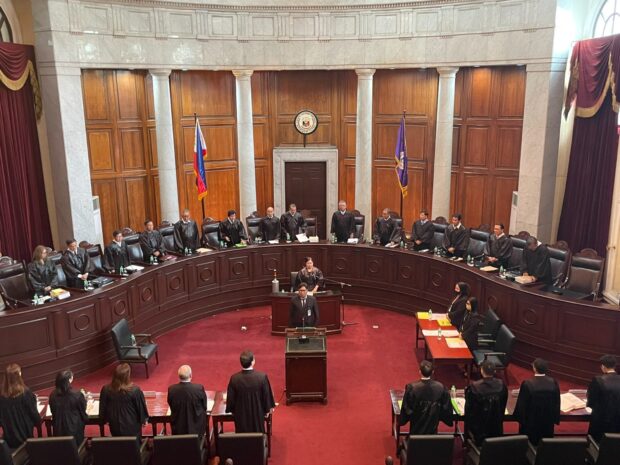SC upholds ruling that junked PCGG’s bid to get Marcoses’ ‘ill-gotten wealth’

Supreme Court (File photo from SC Public Information Office)
MANILA, Philippines — Supreme Court has upheld the decision of Sandiganbayan dismissing the case filed to recover the alleged ill-gotten wealth of former President Ferdinand Marcos Sr., his family and his cronies, through their estate.
Sandiganbayan previously issued the decision in June 2012, in response to the petition submitted by Presidential Commission on Good Government (PCGG).
In 1987, PCGG filed cases for ‘reversion reconveyance’ and damages against the former President, former first lady Imelda Marcos, son President Ferdinand “Bongbong” Marcos Jr., and daughters Senator Imee Marcos and Irene Araneta, as well as their allies.
Reversion means the right of government to take back properties if the conditions of the grant or laws have been violated.
Reconveyance is an action to transfer ownership back to the grantee or any party who has a right to the property.

Sandiganbayan had dismissed the cases, which were mostly civil in nature.
PCGG then elevated the cases in four separate petitions before the Supreme Court, which were also junked.
In this recent case made public Tuesday, Supreme Court said, “The pieces of evidence relied upon by the Republic failed to establish all its elements.”
“Notably, some of these pieces of evidence are even of doubtful admissibility,” the ruling noted.
Supreme Court Associate Justice Rodil Zalameda wrote the decision.
The case involved companies under tycoon Lucio Tan, to which Marcos and respondent Imelda allegedly granted concessions or they either have interests or beneficial ownership.
These firms include the following:
Shareholdings, Incorporated
Asia Brewery
Allied Bank
Fortune Tobacco
Maranaw Hotels
Virginia Tobacco Redrying Plant
Northern Tobacco Redrying Plant
Foremost Farms
Sipalay Trading
Himmel Industries
Grandspan Development Corporation (Grandspan)
Basic Holdings Corporation
Progressive Farms, Incorporated
Manufacturing Services and Trade Corporation
Allied Leasing & Finance Corporation
Jewel Holdings, Incorporated
Iris Holdings and Development Corporation
Virgo Holdings and Development Corporation
Through PCGG, the state sought to recover properties, including two aircraft and shares of stocks from the respondent corporations and Century Park.
In its recent ruling, SC said the evidence presented by the commission failed to establish that the assets and properties covered by the complaint were illegally acquired.
“It appears, however, that none of the pieces of evidence relied upon by the Republic was successful in establishing the manner by which respondents allegedly acquired ill-gotten wealth,” the resolution stated.
“It was not shown, through these pieces of evidence, if and how respondents took undue advantage of their office, authority, influence, connections, or relationship,” said the justices.
SC reiterated the findings of Sandiganbayan that it could not find proof that Tan received concessions or that his business ventures benefitted from Marcos.
“It held that the Republic failed to demonstrate how Marcos’ grant of favors and privileges to a corporation resulted in the government’s ownership of its shares, assets, and properties that may be recovered as ill-gotten wealth,” the High Court said.
It further said the testimony of Imelda stating that Marcos had 60 percent beneficial ownership in Tan’s companies does not prove undue advantage of office, authority, influence or connection.
Beneficial interests of Tan’s companies were held in trust by the business tycoon and his associates, who are stockholders of the businesses.
Regarding Tan’s written disclosure, the High Tribunal said it cannot be admitted as evidence for lack of authentication.
“As a rule, before a private document is admitted in evidence, it must be authenticated either by the person who executed it, the person before whom its execution was acknowledged, any person who was present and saw it executed, or who, after its execution, saw it and recognized the signatures, or the person to whom the parties to the instruments had previously confessed execution thereof,” SC explained.
On the testimony of Marcos Jr. about the reported meetings between his father and Tan on the supposed 60-40 business arrangement, the High Court declared his testimony as hearsay, which cannot be used as evidence of the prosecution.
“After due consideration of the foregoing, it is clear that Marcos Jr. does not have personal knowledge of the alleged 60-40 business arrangement or the share transfers between and among the various corporations,” the magistrates said.
“It does not appear that he was privy to any of these transactions,” they added.
Moreover, SC affirmed Sandiganbayan’s resolution on December 22, 2010, dismissing the ill-gotten wealth case against two of the respondents, Don Ferry and Cesar Zalamea, concerning the anomalous Sipalay deal.
High Court also rejected PCGG’s petition seeking the reversal of Sandiganbayan’s resolution issued on July 8 and August 23, 2011, denying its motion to admit a third amended complaint.
The complaint had sought to include Philip Morris, Fortune Tobacco, and several individuals as respondents in the case.